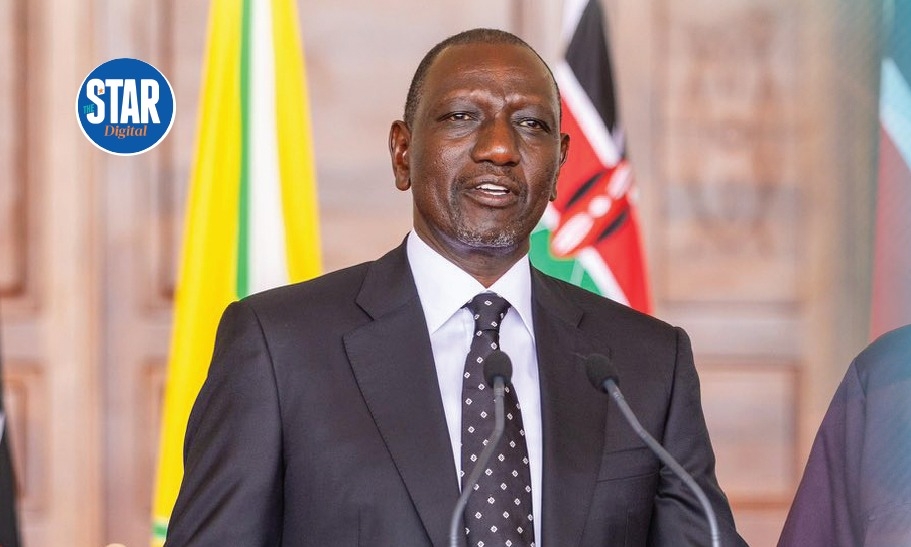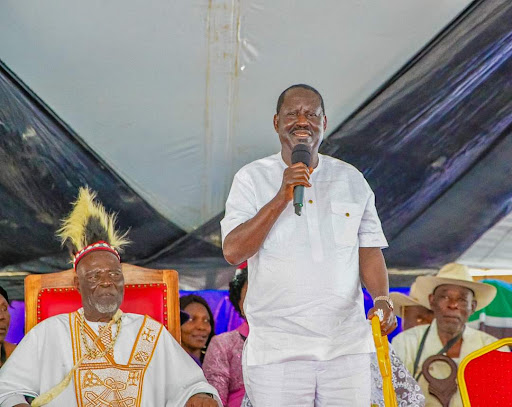
Raila's death: What President Ruto has declared
He died on October 15, 2025
For more than four decades, he stood at the centre of Kenya’s most defining moments, admired, feared, misunderstood, but always impossible to ignore.
In Summary

Audio By Vocalize

IN the long arc of Kenya’s political journey – from the fi res of independence, through the struggles for multiparty democracy, to the ongoing fierce succession politics – few names resonate as deeply as that of Raila Amolo Odinga.
His life was a tapestry woven with defiance, resilience, sacrifice and an unyielding belief in a fairer Kenya.
Raila was not just a politician; he was a movement, with an almost cult-like following. His supporters called him “Baba,” not out of political flattery, but affection.
For more than four decades, he stood at the centre of Kenya’s most defining moments, admired, feared, misunderstood, but always impossible to ignore.
Whether one loved or loathed him, none could deny that Raila shaped the trajectory of Kenya’s democracy like no other.
President William Ruto, Raila’s former political nemesis-turned-friend, described him as “a once-in-a-generation leader.”
“He was a colossus of Kenya’s modern politics, an indomitable warrior in our struggle for freedom and prosperity, and a statesman of boundless selflessness,” Ruto stated.
“Raila Amolo Odinga’s name will forever be etched in the story of our Republic: A story of struggle, sacrifice, courage, rule of law, hope, and our pursuit for excellence,” Raila, who rose from a fiery political activist to MP, Prime Minister, and Kenya’s longest-serving opposition leader, breathed his last on Wednesday.
His sudden death plunged the nation into mourning, throwing into disarray the 2027 succession politics.
Raila may never have been declared president, but, as his former spokesman Salim Lone observed, he remained more loved than any president in Kenya’s history.
“This is the saddest day in our history,” Lone stated.
“Kenya will never be the same. Millions of hearts have been broken, mourning the passing of a leader who was never allowed to be president. And yet he still remained beloved for many more years than any president ever was, because Kenyans knew he was the one making sacrifices and fighting for a better life for them by reducing our gross inequalities,” he said.
Lone, one of Raila’s closest associates, did not mince words in his assessment, declaring that Raila won the presidency at least twice without being declared.
“While all our presidents curtailed our freedoms and rights to entrench their power and wealth, Raila’s vast popular following allowed him, without ever holding power, to enlarge democracy and inclusion for the struggling masses and the marginalised communities that languished in the farthest corners of this great land. That is why despite at least twice winning the presidency, it was the loser who was announced the winner”.
Born in 1945 to Jaramogi Oginga Odinga, Kenya’s first Vice President, Raila inherited not just a name, but also a mission — to challenge the entrenched and speak truth to power.
His political baptism came at a time dissent was treasonous, and his courage to oppose authoritarian rule earned him eight straight years in detention — the longest in Kenyan history.
Yet, from the solitude of his cell, Raila’s spirit only grew stronger.
When Kenya’s push for multiparty democracy gained momentum in the late 1980s and early 1990s, Raila was its fiery heartbeat.
Alongside other reformists, he helped dismantle the single-party system and expanded the boundaries of political freedom.
The 2002 transition, which ended Kanu’s four-decade reign, bore his unmistakable imprint. His rallying cry, “Kibaki Tosha!”, remains one of the most selfless acts in Kenya’s political history.
In a powerful tribute, Kisumu Governor Anyang’ Nyong’o, his peer in the revolution, said Raila “stood tall, not because he sought power, but because he was power.”
“To say he is gone feels dishonest. Because a man like Raila cannot be erased by time or death. His fi ngerprints are on our constitution. His footsteps are in our polling stations. His fi re lives on in every Kenyan who dares to speak truth to power,” Nyong’o, one of Raila trusted associates, stated.
Raila’s political career was marked by both triumph and tragedy.
He won hearts but often lost elections, many of them fiercely contested and, in the eyes of his supporters, stolen.
Yet, in every defeat, he became a larger figure, cobbling even more giant coalitions and rebranding for a new political season. A year after his defeat in the 2013 presidential election, for instance, Raila retreated to the United States for a two-month sabbatical.
His critics in the then-ruling Jubilee coalition declared his career over, dismissing him as a spent force.
But even in his absence, Raila’s presence loomed large. His supporters, frustrated by what they saw as growing misrule, began an online campaign under the hashtag #BabaWhileYouWereAway, chronicling the country’s woes and calling for his return.
When he finally came back, Raila reignited the national conversation with renewed vigour, mounting one of his most consequential presidential runs in 2017.
That election, in which Uhuru Kenyatta was declared the winner, would later be nullified by the Supreme Court — the first such decision in Kenya and on the African continent.
Citing the failure to implement key electoral reforms, Raila boycotted the repeat poll, cementing his image as a steadfast reformist unwilling to legitimise what he viewed as a flawed process.
Former President Uhuru Kenyatta, whom he competed with in two fiercely contested polls, said Raila was not a man you faced in an election without a plan.
“Baba, as we fondly referred to him, was a man who made you sharpen your own ideas, compelling you to defend your positions with rigour and passion,” Uhuru said.
But for Raila, politics was never personal. He could easily embrace his harshest critic.
He was a man who read moments of defeat not as endings, but as openings for recalibration.
These qualities came sharply into focus through his historic handshakes with Uhuru and later William Ruto.
Coming after the disputed 2017 elections and months of street protests, Raila stunned both allies and opponents by extending an olive branch to Uhuru, his long-time rival.
Many saw it as betrayal; others as statesmanship. But beneath the symbolism was a calculated move — to restore stability, end political violence, and reclaim influence from outside government.
As a consequence of that hand shake, Uhuru would later agree to back Raila for the presidency in 2022. He lost narrowly by just about 200,000 votes to Ruto.
Years later, his handshake with President Ruto, following the contested 2022 election, again showed a master tactician at work.
Despite mounting pressure from his base, Raila opted for dialogue over confrontation, securing a bipartisan process to reform the electoral commission and maintain calm in a politically charged nation.
It was a familiar play: transforming political tension into opportunity.
But Raila’s legacy cannot be measured merely in electoral losses for the top job, but in the democratic culture he helped entrench.
Devolution, constitutional reform, and the bold 2010 constitution, all carry his fingerprints.
The idea that power must flow from the centre to the grassroots found its loudest champion in him.
To his deathbed, Raila strenuously opposed allocating CDF funds to MPs. He instead championed for the funds to be sent to the counties.
Even his fiercest critics concede that Raila was not just any ordinary politician. For the better part of his career, he spoke the language of the people.
Raila was the grandmaster of political dissent in Kenya.
He numerously led bloodied street protests and would for the longest time be the only politician who could bring the country to a standstill.
Raila was one of Kenya’s most vocal advocates for a parliamentary system of government.
He argued that it promotes inclusivity, accountability, national cohesion and was the only way the small tribes could ascend to the presidency.
In Raila’s view, a parliamentary system—where executive authority is derived from and answerable to Parliament—would ensure broader representation and continuous oversight of leadership.

He died on October 15, 2025